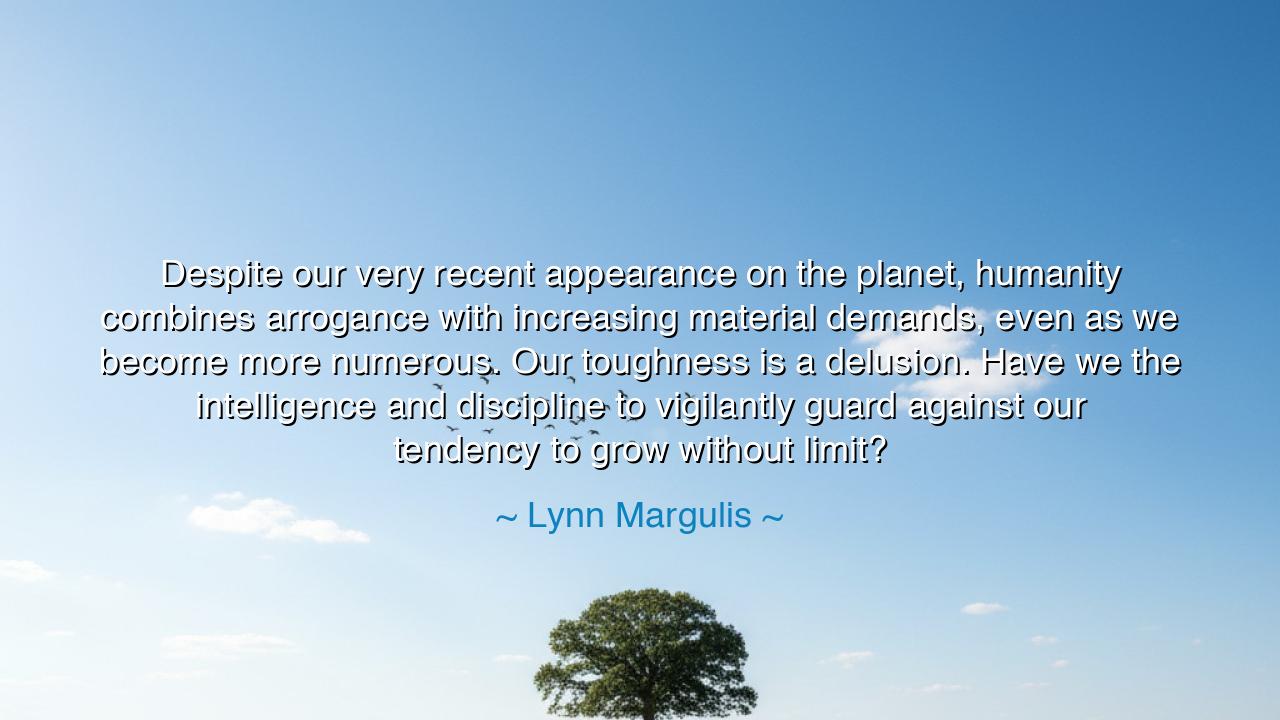
Despite our very recent appearance on the planet, humanity
Despite our very recent appearance on the planet, humanity combines arrogance with increasing material demands, even as we become more numerous. Our toughness is a delusion. Have we the intelligence and discipline to vigilantly guard against our tendency to grow without limit?






When Lynn Margulis wrote, “Despite our very recent appearance on the planet, humanity combines arrogance with increasing material demands, even as we become more numerous. Our toughness is a delusion. Have we the intelligence and discipline to vigilantly guard against our tendency to grow without limit?”, she spoke not only as a scientist but as a prophet of the Earth. Her words are an indictment, a warning, and a plea — forged from both love for the living world and sorrow for its desecration. They ring with the timeless wisdom of the ancients: that those who forget their place within creation will bring about their own undoing. For she saw what many refuse to see — that humanity’s power, though dazzling, has become its greatest peril.
Lynn Margulis, one of the great evolutionary biologists of the twentieth century, was known for her revolutionary theory of symbiosis — the idea that life evolved not through endless competition but through cooperation, through the merging and mutual dependence of organisms. Yet in this quote, her tone darkens. She speaks as one who has watched the children of the Earth turn against their mother. She reminds us that our species is but a newcomer in the grand story of life — a flicker in the billions of years since the first cells stirred in the ocean depths. And yet, in our short tenure, we have acted not as guests, but as conquerors. We have built empires of metal and smoke, cut down the forests that gave us breath, and called ourselves tough — as if power were proof of permanence.
But Margulis warns that this toughness is a delusion. She knew, from a lifetime studying life’s intricate web, that no organism can grow without limit, no system can expand forever. In nature, unchecked growth is not strength — it is cancer. Civilizations, like bodies, perish when they devour their own foundations. The arrogance of our age lies in believing we are exempt from the laws that govern all other life. We speak of conquering nature, yet it is nature that sustains us; we boast of mastery, yet we are still as fragile as the coral and the bee. To live as though we are apart from the Earth is to live in blindness.
The question she poses — “Have we the intelligence and discipline to guard against our tendency to grow without limit?” — strikes at the heart of human destiny. For the tragedy of our species has never been ignorance, but arrogance. We have the intelligence, but not always the discipline; the knowledge of what must be done, but not the will to restrain ourselves. It is a question that echoes through history: the fall of Rome, glutted by expansion and greed; the collapse of Easter Island, where people cut down the last tree that could have saved them; the dust of Mesopotamia, once a cradle of civilization, now a desert where rivers ran dry. Each of these was a warning written in the bones of time — that growth without wisdom becomes ruin.
Consider the story of the Easter Islanders, that remote civilization that felled every tree upon its land to build monuments to its own glory — the great Moai statues, symbols of pride and power. When the forests were gone, the soil eroded, the birds vanished, and famine took hold. They were not conquered by an enemy, nor undone by weakness, but by their own blind ambition. Margulis’s words are the modern echo of that same ancient mistake. We too build our monuments — of steel, of oil, of endless consumption — believing that our cleverness will shield us from consequence. But the laws of life are unchanging: what cannot balance itself, must fall.
Yet Margulis’s message is not one of despair, but of awakening. She believed in the intelligence of humanity — in our ability to learn from nature, not dominate it. Just as life itself evolved through cooperation, she urged us to live by the same law: to see the Earth not as a resource, but as a partner. Her question — “Have we the intelligence and discipline?” — is a challenge to our generation and all that follow. Intelligence without humility is dangerous; discipline without compassion is hollow. But if we can unite knowledge with reverence, science with stewardship, then perhaps we may yet preserve both the world and our place within it.
So, my child, take this as both a warning and a charge: be vigilant against arrogance. Learn from the forest and the river, from the cell and the star. Let your intelligence be guided by discipline, and your ambition tempered by awe. Do not seek to grow without limit, but to grow in harmony. For as Lynn Margulis teaches, the Earth is not our possession — it is our inheritance, and our responsibility. If we remember this, if we act with restraint and wisdom, then humanity may yet prove itself not the destroyer, but the guardian, of life’s eternal song. But if we forget — if we continue to believe our toughness makes us untouchable — then the Earth, ancient and patient, will remind us that even the mightiest species is dust beneath her timeless hand.






AAdministratorAdministrator
Welcome, honored guests. Please leave a comment, we will respond soon